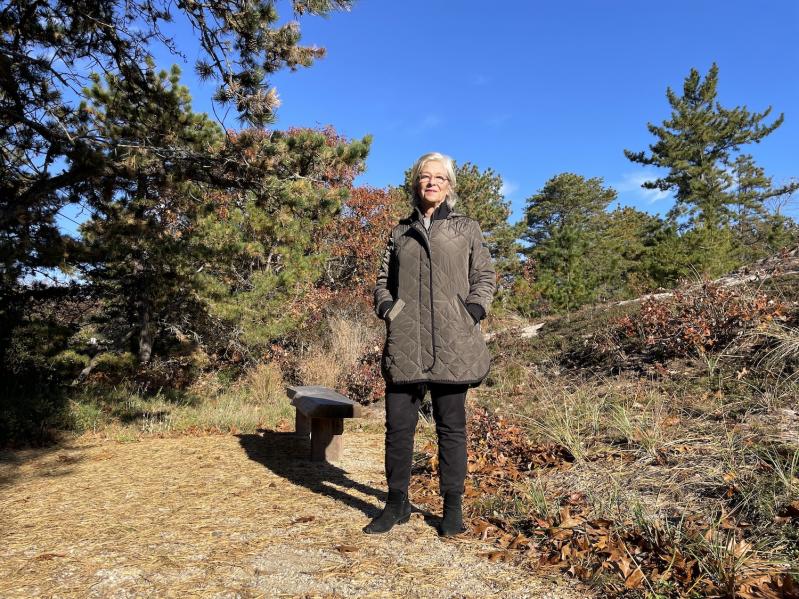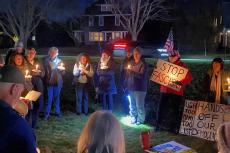As we come to the end of a year in which manifestations of climate change were observed on the South Fork and around the world, there is a growing understanding that business as usual cannot continue, including in the way land is used and managed.
In East Hampton Town, that awareness is infused in ongoing discussions about the zoning code: last summer, many residents who spoke at a town board work session about amending the code pointed to development characterized by huge residences, and the mass clearing of vegetation required to build them, as an environmental calamity alongside the continued burning of fossil fuels.
Margie Ruddick of the landscape planning and designing firm that bears her name has drawn the proverbial line in the sand. Ms. Ruddick, who owns a house in Amagansett, said last month that she has chosen to stop taking on projects that involve new construction, except for well-scaled additions.
“I have known for years how unsustainable new construction is,” said Ms. Ruddick, recipient of the 2006 Rachel Carson Women in Conservation award and the 2013 Cooper Hewitt National Design Award in Landscape Architecture. “But in the past year the proliferation of huge houses in Amagansett at the same time that I have been doing all this conservation work has been so disheartening, like ‘what am I doing here, anyway?’ ”
Ms. Ruddick leads One Landscape, a not-for-profit collective that promotes conservation of wild landscapes and develops sustainable conservation roadmaps. One Landscape developed a 300-acre retreat and institute in India’s Western Ghats that included a reforestation project that saw the planting of a million plants over a decade. Her work with One Landscape, she said, prompted the question, “how can I work on new construction when on the other hand I am promoting innovative conservation practices?”
A neighbor, Jaine Mehring, is the founder of build.in.kind/East Hampton, which was a catalyst in the town board’s move to revisit the zoning code with an eye toward reining in the development boom. Via social media, Ms. Mehring has drawn attention to the proliferation of oversize houses and overclearing of land. “Watching Jaine Mehring posting and posting and feeling like the people who are doing the most harm are never going to listen,” Ms. Ruddick said, “we, the designers, the contractors, have to draw a line in the sand. There will be others who will take on the jobs I decline, but just by letting people know this is not something we can participate in any longer, maybe it will change a few people’s attitudes.”
Among the manifestations seen this year -- smoke from Canadian wildfires, temperature records broken almost daily, historic flooding, and the appearance of deadly bacteria in seawater that killed at least three people in New York and Connecticut and sickened at least one East Hampton resident -- Ms. Ruddick pointed to another disquieting development. “The projects with new construction are not only grossly disruptive, but they also aren’t doing that well,” she said. “The mortality rates of new plantings in this new climate have crept up to alarming levels. Plants we have used as our stalwarts are succumbing to sudden blights.”
The destruction wrought by the southern pine beetle is self-evident. But the problem goes beyond that species. Ms. Ruddick pointed to a project in Quogue, where “plants that have been go-to survivors are in decline, like aspens. Beeches are on the way out. Even cedars are struggling.” Some plantings die, and others languish, she said. “Some are just struggling along, may die soon, but mostly likely will later, prematurely. It is kind of a perfect storm of much more extreme drought than the landscape is used to, torrential rains, [and] freak winds.”
Scott Warren, the Jean C. Tempel ‘65 Professor Emeritus at Connecticut College who has published extensively on wetlands and tidal marshes, said it is clear that “climate change and other human activities -- most specifically the introduction of invasive pathogens -- are combining to devastate a growing number of native plant species. Ash is now going the way of American elm and beech is threatened by a recently introduced nematode, and . . . climate, introduced insects, and disease threaten oaks” in the United States and around the world. These are three “poster children” for ecologically and commercially critical tree species, he said. “There are more trees, shrubs, and herbaceous plants that are newly under stress from global warming and pests/disease, and that list is growing.”
Ms. Ruddick’s personal decision to stop working on new construction projects is not a remedy, she said, “but on projects in existing landscapes the proportion of new planting to existing is lower, so the struggle is less noticeable.” Likewise, overdevelopment is not necessarily directly responsible for these blights, she said, “but it’s hard to keep making big new houses and their landscapes when it’s so clear we are in an environmental cascade.”
The campaign has inspired her to seek alliances, both with landscape architects and like-minded activists. She has spoken with members of the former camp about engaging a climate-change specialist to vet projects and educate customers. More recently, she and Ms. Mehring have jointly invited the local organizations ChangeHampton, a group of residents who are concerned about climate change, biodiversity loss, and the decline in insect and bird species; Climate Change Resources, founded by Lena Tabori of the town’s energy sustainability advisory committee, and Perfect Earth Project, which promotes nature-based, toxin-free land care practices, to meet early next month to pool resources and formulate an action plan to promote responsible landscape stewardship.
“I am eagerly looking forward to it,” Leonard Green, a co-founder of ChangeHampton, said of the meeting. “As you well know, we are in a catastrophic moment. Anyone paying attention to the worldwide weather anomalies, ocean temperatures, droughts, floods, and so on gets it. Yet we continue doing business as usual, sleepwalking into disaster.”
ChangeHampton’s mission, he said, “has always been to promote restorative landscaping, to educate and create more native/pollinator landscapes. We are working to develop new projects, and yes we will be collaborating with everyone who shares that mission, and we champion this and any effort to strengthen town regulations regarding restoration of resilient ecosystems.”
“Equally important is getting the public to understand that what we do on and with our properties affects us all,” Mr. Green added. “We hope to work with anyone who will get this message out.”
Ms. Ruddick said that she sees her role as a promoter of positive practices beyond simply not working on new construction projects. It’s also about “adaptive reuse and restoring things, making a landscape that is livable,” she said. “Not using up so many resources but also making beautiful places. I think that’s where I feel I can’t just take a stand and complain, I have to say what am I going to do that’s positive.”
“I would hope,” Ms. Mehring said, “that every person who influences or impacts land, the water, and nature has an ethical compass, and that at some point more people will start to follow that ethical compass. I think Margie has.”




